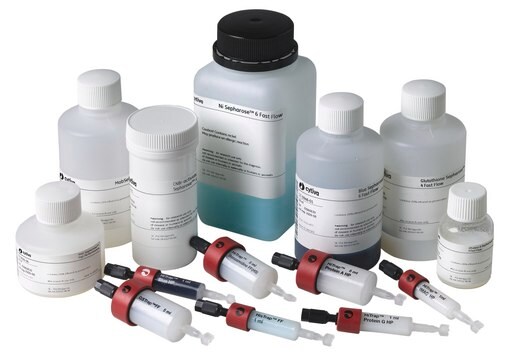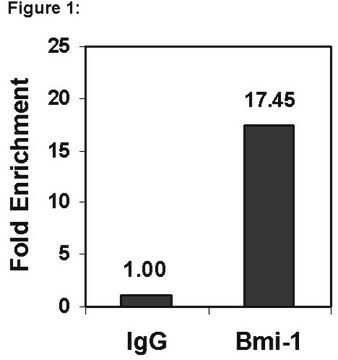IP04
Protein G Plus-Agarose Suspension
Protein G PLUS agarose suspension specifically formulated for immunoprecipitation.
Iniciar sesiónpara Ver la Fijación de precios por contrato y de la organización
About This Item
Código UNSPSC:
41116133
NACRES:
NA.56
Productos recomendados
formulario
slurry (Liquid)
contiene
≤0.1% sodium azide as preservative
fabricante / nombre comercial
Calbiochem®
condiciones de almacenamiento
do not freeze
técnicas
immunoprecipitation (IP): suitable
idoneidad
suitable for immunoprecipitation
Condiciones de envío
wet ice
temp. de almacenamiento
2-8°C
Descripción general
Designed for immunoprecipitation applications. This product is blocked with BSA to reduce non-specific binding and cannot be used for purification; best for bovine, goat, human, and rat IgG and for mouse IgG1.
Protein G PLUS agarose suspension specifically formulated for immunoprecipitation.
Advertencia
Toxicity: Standard Handling (A)
Otras notas
Agarose solution is supplied ready to use. Protein G Plus agrarose is blocked with BSA and should not be used for immunoglobulin purification or covalent cross-linking. For immunoprecipitation reactions 15 µl/µg primary antibody is recommended. Preclearing will minimize extra bands resulting from nonspecific precipitation. To preclear, add to the sample 20 µl agarose conjugate and 1 µg normal IgG from the same species as the immunoprecipitating antibody. When immunoblotting is used for detection, some secondary antibodies can react nonspecifically with BSA or other proteins present at high concentrations in the sample. This can be eliminated by reducing the concentration of secondary antibody.
Información legal
CALBIOCHEM is a registered trademark of Merck KGaA, Darmstadt, Germany
Código de clase de almacenamiento
11 - Combustible Solids
Clase de riesgo para el agua (WGK)
WGK 1
Punto de inflamabilidad (°F)
Not applicable
Punto de inflamabilidad (°C)
Not applicable
Certificados de análisis (COA)
Busque Certificados de análisis (COA) introduciendo el número de lote del producto. Los números de lote se encuentran en la etiqueta del producto después de las palabras «Lot» o «Batch»
¿Ya tiene este producto?
Encuentre la documentación para los productos que ha comprado recientemente en la Biblioteca de documentos.
Los clientes también vieron
Leo K Iwai et al.
Journal of proteome research, 9(6), 3135-3145 (2010-05-05)
Type 1 diabetes, in human patients and NOD mice, results from an immune attack on insulin-producing beta-cells of the pancreas by autoreactive T lymphocytes. In NOD mice, genetically controlled perturbations in the signaling pathways downstream of the antigen-specific T cell
Hayeong Kwon et al.
Journal of cellular and molecular medicine, 13(8A), 1549-1564 (2009-09-26)
Mitogenic regulation by caveolin-2 in response to insulin was investigated. Insulin triggered phosphorylation of caveolin-2 on tyrosine 19. Insulin increased the interaction between pY19-caveolin-2 and phospho-ERK, and that interaction was inhibited by a MEK inhibitor U0126. Insulin-induced interaction of caveolin-2
Kensuke Sakamoto et al.
Molecular biology of the cell, 21(16), 2966-2974 (2010-06-25)
CREB (cyclic AMP response element-binding protein) is a stimulus-induced transcription factor that plays pivotal roles in cell survival and proliferation. The transactivation function of CREB is primarily regulated through Ser-133 phosphorylation by cAMP-dependent protein kinase A (PKA) and related kinases.
Siqi Li et al.
The Journal of pathology, 254(3), 265-278 (2021-04-03)
Chemoresistance is a major obstacle to the treatment of triple-negative breast cancer (TNBC), which has a poor prognosis. Increasing evidence has demonstrated the essential role of cancer stem cells (CSCs) in the process of TNBC chemoresistance. However, the underlying mechanism
Roshia Ali et al.
Frontiers in oncology, 12, 841303-841303 (2022-03-12)
SNTA1 signaling axis plays an essential role in cytoskeletal organization and is also implicated in breast cancers. In this study, we aimed to investigate the involvement of actin cytoskeleton in the propagation of SNTA1/p66shc mediated pro-metastatic cascade in breast cancer
Nuestro equipo de científicos tiene experiencia en todas las áreas de investigación: Ciencias de la vida, Ciencia de los materiales, Síntesis química, Cromatografía, Analítica y muchas otras.
Póngase en contacto con el Servicio técnico








